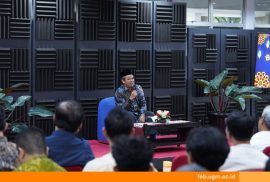Indonesia, is one of the countries trapped in middle income status, even since the 1960s. This trap is caused by the failure of middle-income countries to have faster labor productivity growth through technological innovation and industrial upgrading than high-income countries. Prioritizing the use of limited resources, facilitating technological innovation, and supporting industrial improvement in the form of a policy are very crucial factors for middle-income country governments to be a solution to this problem.
Therefore, the Faculty of Economics and Business, University of Gadjah Mada (FEB UGM) in collaboration with the Australian National University (ANU) and Institute for Economic and Social Research (LPEM) Universitas Indonesia, on Friday (13/11) held the Public Lecture entitled “Industrial Policies to Escape the Middle-Income Trap: A new structural economics approach for Indonesia”. This public lecture is a combination of two annual events, namely the Mubyarto Public Policy Forum which has been held in honor of the late Professor Mubyarto, an Economist from Universitas Gadjah Mada and The Sadli Lecture, an event to honor the late Professor Mohammad Sadli, one of the “Orde Baru” economic architects from the Universitas Indonesia. Both Professor Sadli and Professor Mubyarto are economists who have contributed greatly to Indonesia, particularly in intellectual debates about Indonesia’s development policies. The speaker at the public lecture was Prof. Justin Yifu Lin from Peking University, and as discussant Dr. Muhammad Edhie Purnawan as a Lecturer from FEB UGM and Dr. Kiki Verico as Lecturer at FEB UI.
Dr. Kiki Verico conveyed important issues in Indonesia’s industrialization program, namely about comparative advantage in various sectors, low investment and human resources, and how the role of the market and government in adapting to the digital economy.
“The government is facing a dilemma which needs to take precedence, improvement of Human Resources or industrial development and investment?”, Said Verico.
Meanwhile, Dr. M. Edhie Purnawan focused on efforts to handle MiddlE-Income Trap in Indonesia. He said that the Middle Income Trap occurs because as a country that sells more and is getting richer, then there is an increase in wage payments, and an increase in the cost of selling stuff.
“Therefore, they lose their competitive advantage and get stuck, so they are unable to sell more and become richer,” said Edhie.
Edhie said that examine Indonesia was a constructive thing. This is because Indonesia is part of a developing economy that is the most prominent against the Middle-Income Trap trend. It offers a solution so that more industries are transformed digitally, not online in cities but towards villages that create more market value. Then it is also necessary to build a Special Economic Zone (KEK) as a New Economic Corridor to introduce new cities.
Edhie said that the problems of economic stability and political stability were factors that need to be considered in order for industrialization policies in Indonesia to be successful.
“Even though Middle-Income Trap is difficult to fight, it does not mean that it is impossible, with our focus on industrial human capital, and improving frontier technology, Middle-Income Trap will be tackled faster,” said Edhie.
Prof. Justin Yifu Lin conveyed the condition of Indonesia which has been trapped in the middle income level since the 1960s. He presents data on Indonesia’s per capita Gross Domestic Product (GDP) in the early 1960s which is almost similar to the lower middle class. From these data, the GDP per capita of Indonesia has been shown to slowly increase until in the 1990s it reached 80% to 100% of the average GDP per capita of middle-income countries. Until 1997-1998 just before the Financial Crisis hit Asian countries, Indonesia’s GDP per capita increased slightly (above 100%) from the average middle class country. However, since then, Indonesia has been trapped at the lower middle level. Prof. Lin said that there were other countries which in the early 1960s had a similar situation to Indonesia, such as China, Korea, Malaysia and Singapore, and now they have succeeded in leaving the middle class.
He conveyed a solution to dealing with this, he provided a solution by making a new structural economic approach perspective on the reasons for economic traps and how to avoid them, and he also give some implications for Indonesia. Being given the title of “new”, according to him, is to distinguish it from the “old” structural approach adopted after World War II, namely the development of capital and technology to increase worker productivity.
He said that there are six practical steps that can be implemented, one of which is strengthening industrial zones. Other steps include providing incentives in the form of subsidies, tax and credit facilities, and facilities to obtain foreign currency for pioneer companies. According to him, this new approach is more realistic, because no country has managed to get out from middle income status without being balanced with strong industrial policies. One key is to target industrial policy in sectors where the country has abundant resources. Indonesia itself has two abundant resources, namely natural resources and human resources.
“The implication is that the Indonesian government needs to act as a facilitator in an effective market to enable technological innovation and industrial improvement,” said Lin.
“Indonesia must also be able to maintain a 7% or more growth rate every year for 20 years and become a high-income country with the support of industrial policies to increase the country’s industrial diversification,” he concluded.
Source: Sony Budiarso / Leila Chanifah Zuhri




